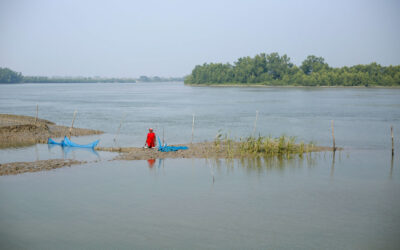About Us
Who We Are
A team of local youths formed a Science Hobby Centre named Gobardanga Yuba Bijnan Sanstha in 1967 with an aim to disseminate scientific knowledge among common people with the ethos that youth should develop voluntary spirit in heart and work with a scientific approach at the community level, so that community can play a major role in the development process.

It started with developing Teaching Learning Materials as a supplement to what the students learn in their books so that learning becomes more interesting, and various other scientific models and projects based on local resources and rural technologies, like solar cooker, solar drier, solar water distiller, multipurpose oven, seed sprinkler, bio-gas plant, earthen thermo flask, village refrigerator, village incubator, and many other innovations based on indigenous knowledge and skills. In course of time it expanded its activities in the fields of health & nutrition, agriculture, natural resources management and conservation of bio-diversity.
With the changing scenario in the 1990s, when it became difficult for an unregistered society to continue its activities, a few likeminded volunteers shared their idea to develop a professional institution keeping the voluntary spirit of the organisation, so that the professional expertise available should be utilized for developmental planning, implementation and application of scientific knowledge in a sustained manner. Subsequently a team of volunteers with expertise in Partnership Management, Gender & Development, Training and Documentation, Participatory Monitoring & Evaluation, Resettlement & Rehabilitation, Disaster Risk Management, Action Research, Planning and Facilitation, Health and Sanitation, Education, etc. formed PROFESSIONAL INSTITUTE FOR DEVELOPMENT AND SOCIO ENVIRONMENTAL MANAGEMENT – PRISM in 2000 as a Registered Non-Profit making organization under the Societies Registration Act 1961, Govt. of West Bengal.
PRISM is primarily aiming at developing a sustainable, integrated and people-centered development strategy generated through field experiences. It takes up research and consulting jobs through which resources are pulled together and implementation works at the field level are supported.
Our Innovations:
• Developing and implementing innovative Climate Smart Devices, for the rural communities, like Folding Solar Cooker, Box type Solar Cooker, Folding Solar Drier, Solar Water Distiller, Solar Geyser.
• Similarly developed a Climate Smart Multipurpose Cooking Range for the Rural Households where people use fuel wood & agricultural waste for cooking.
• Developed Rural Ambulance, which is an improvised version of the common rickshaw van, well designed to serve the purpose of an ambulance in a much more effective way.
• Developed and commissioned Low cost Water Purifier for safe drinking water. Community Participation for Safe Drinking Water Management in the Arsenic prone zones of India & Bangladesh, Fluoride Prone areas of India, High Saline areas of Bangladesh and Vietnam. Also implemented Surface Water Treatment Plant and Sub-surface Water Treatment Plants to avoid contaminants like arsenic, fluoride, iron, etc. also to reduce the use of ground water and promote Rain Water Harvesting.
• Promoted and introduced the concept of organic farming, Systemic Crop Intensification; Restrict pest movement by using medicinal plants between the agricultural plots; Pitcher and Bottle irrigation to reduce the use of water for irrigation; Protection of plants root network; Agriculture in flood prone areas; Vertical gardening for urban areas; Nutrition gardens; Maximizing land use through raft gardening; Duck-Fish culture & Composite Farming; Preparing Bio-compost Vermi-Compost, Bio-0pest Control, Plant Nutrients using low cost and mostly waste materials; Organic food processing & marketing; etc.
• Constructed Cyclone-Flood-Earth Quake resistant Stilt House for shelter of individual vulnerable families.
• Installed Sanitary Napkin Making machine and started producing Low Cost-Wings-Ultrathin Sanitary Napkins to help the girls’ & women o the underprivileged areas.
• Constructed Low-cost Vegetable Store where shelf life of vegetables/ fruits/ flowers will increase for 6-7 days, this will help increase the bargain power of the marginal farmers.
• Inroduced a model for minimizing the evaporation loss of surface water.
